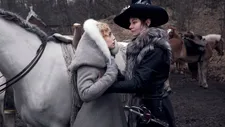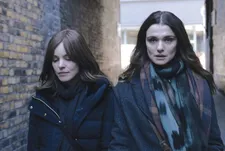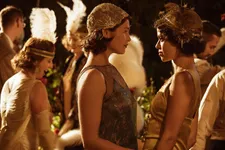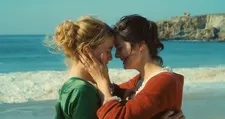This week is Lesbian Visibility Week, and for film fans, there’s a lot to celebrate. Despite the prominence of lesbians behind the scenes in Golden Age Hollywood, love and lust between women has been a taboo subject – or at least one considered unmarketable – for much of cinema history. Tragedies like The Children’s Hour, coded but non-explicit works like Thelma And Louise, and films like Blue Is The Warmest Colour, whose sex scenes make no sense unless approached as pornography for the male gaze, have left women who desire women with very little representation. Rare exceptions like Desert Hearts and The Watermelon Woman have had to do a lot of heavy lifting and were, for most of their history, very hard for most people to get access to. Over the last few years, this has finally begun to change, with mainstream films beginning to lose their fear of queer women and films explicitly dealing with lesbian films proving that they can enjoy box office success, and win awards, around the world. We’re shining our Spotlight on seven of the best from the past few years, which depict something of the variety and complexity of lesbian life.
 |
| Ammonite |
Ammonite - Virgin TV Go, Amazon, Apple TV
Set in 1840s England, this film is loosely based on the real life of fossil hunter Mary Anning, a woman who lived close to the poverty line throughout her life and whose significant contributions to palaeontology were only recognised after her death. Played by Kate Winslet, she’s presented as a robust, practical woman who nevertheless has troubles in her past and at least one broken relationship with a local woman, whose jealousy is immediately aroused when she is – despite her own protests – given charge of a scientist’s wife (Saoirse Ronan) who is fragile both physically and emotionally and has been prescribed sea air. The desire which Mary comes to feel for a woman she initially despises is skilfully wrought, for all that the film moves very slowly, and although class differences and Mary’s unwillingness to live a lie preclude a conventional happy ending, the connection they find feels no less valuable because of it. The film is notable for sex scenes which defy convention in that they haven’t been remotely prettified. Instead they feel raw and urgent and real.
 |
| Princess Cyd |
Princess Cyd - Amazon Prime, Virgin TV Go, Apple TV
A coming of age tale which opens with tragedy and blossoms into a world of possibility, this Chicago-set drama embraces a world in which young people are free to explore sexuality and gender without the restrictions or expectations which affected the previous generation. It follows the titular Cyd (Jessie Pinnick) who is sent to stay with her aunt Miranda (Rebecca Spence) as her father struggles to cope after her mother’s death. Miranda is easy going and doesn’t like to lay down the law, which leaves Cyd a little uncertain how to proceed, as she’s already unsure what she wants to do with her life – until she meets Katie (Malic White) and her generally flirtatious tendencies give way to more serious interest. Although other experiences bring a darker element into the film, nothing here is explicit, and the film is aimed very much at a young audience. It’s more about identity than sexual desire or even romance, and its freewheeling style makes it a delight to watch. The intergenerational friendship at its core allows for interesting reflections on change as it delivers a positive take on why progress matters.
 |
| Malin with Alekko the horse and Sarah Gadon, who plays the woman she loves. |
The Girl King - Apple TV, Chili, Amazon
As lesbian films with contemporary settings often reflect on the importance of getting away from a repressive past, and as those set in the past often reflect lives constrained by prejudice, it’s worth noting that there were historical women who openly expressed their attraction to other women and lived life on their own terms. This film celebrates one of them: Kristina of Sweden, a key figure in the signing of the Treaty of Westphalia which initiated the European peace project; a friend of Descartes; a woman who took on the Catholic Church, changed the rules of succession, and gave her people free public libraries (even if, as the film suggests, many of them were more interested in free beer). Star Malin Buska bears quite a resemblance to the historical monarch, dashing figure in masculine clothing who was a skilful duellist, rode a powerful horse and seduced a countess (played here by Ebba Gadon). The film explores many different aspects of her life but her sexuality and refusal to adhere to social convention is at the heart of it, and the romance is intense and passionate.
 |
| Rafiki |
Rafiki - BFI Player, Curzon
Banned in its native Kenya until it became apparent that it might be an Oscar contender, Wanuri Kahiu's potent drama, loosely based on Ugandan author Monica Arac de Nyeko's short story Jambula Tree, attracted international attention when it was selected to screen at Cannes in 2018. It's the simple tale of two young women whose passionate friendship turns into something more, challenging local mores and complicating both their lives. Kena (Samantha Mugatsia) is the daughter of an ambitious politician, already regarded as odd because of her androgynous appearance, whilst Ziki (Sheila Munyiva), is the kind of girl she never thought would take an interest in her on any level, pink haired and wild. Perhaps because Kenya has no history of (overt) lesbian cinema, there's a refreshing absence of cinematic cliché here, and the raw, natural performances give the film an energy too often lacking in the West. Importantly, Kahiu refused to give in to pressure to give the film a tragic ending, so that although it doesn't shy away from addressing the homophobia currently rife in the country - and there's one scene that viewers may find particularly distressing - Rafiki (the Swahili word for 'friend') is ultimately a film full of hope - for its heroines and for society more widely.
 |
| Disobedience |
Disobedience - BritBox, Virgin TV Go, Apple TV
The freedom to express one’s sexuality doesn’t just depend on the country one lives in, but also on the community of which one is a part. Here Rachel Weisz plays photographer Ronit, who temporarily takes leave of her easy-going New York life to return to the Orthodox Jewish community where she grew up for the funeral of the father from whom she was estranged. There she reunites with old friends Esti (Rachel McAdams) and Dovid (Alessandro Nivola), and learns that they’re now married. This doesn’t stop the passion which she and Esti used to feel for one another from re-emerging, however, and when it does, it causes all kinds of complications. The scenes between the two female leads are powerful but as well as telling their story, the film looks at the collateral damage done by homophobia and rigid gender roles, and at the complexity of personal choices around sexuality, culture and faith. The central relationship is more interesting because the women have different ideas about love and sex, and Esti’s lack of desire for her husband doesn’t mean that she lacks feelings for him.
 |
| Summerland |
Summerland - Sky Go, Virgin TV Go, Now Cinema
A story of isolation, lost love and renewed possibilities emerging from the chaos of World War Two, Jessica Swale’s beautifully photographed English charmer is seen through the eyes of young evacuee Frank (Lucas Bond), who is sent to the rural south coast to stay with writer Alice (Gemma Arterton) during the Blitz. She’s confused and resentful because she didn’t volunteer to take on a child and is afraid he’ll distract her from her work. Various locals, who did want children and who already dislike her, try to break up the arrangement, but the local vicar (Tom Courtenay), who may know a bit more than he’s letting on, is insistent that it be made to work. As Frank takes an interest in local folklore and gradually wins her over, he begins to grasp the fact that it’s homophobia which has made her an outcast, and she begins to reckon with her past and the legacy of her lost love (Gugu Mbatha-Raw). it’s a story about survival under hostile conditions and the significance that sexual orientation can still have even when one is solitary. The sentimentality of the tale is balanced by comedy just as the bitterness of Alice’s situation is balanced by the boy’s lively affection, and whilst the ending may push the bounds of credibility a bit, it’s one which, in lesbian romances, is long overdue.
 |
| Portrait Of A Lady On Fire |
Portrait Of A Lady On Fire - Virgin TV Go, Amazon, Chili
Winning multiple awards and firmly positioning director Céline Sciamma at the forefront of her craft, this film is a portrait of a romance which is all too brief yet is captured in art and understood like music. Noémie Merlant is Marianne, a painter who works independently, without the oversight of a husband or any other man, and who is therefore viewed with suspicion from the outset, yet valued for her skill. Adèle Haenel is Héloïse, the young woman whose portrait she has been commissioned to paint in the run-up to an unwanted arranged marriage. Both are bursting with creativity and ambition, yet face different frustrations, and it is when they recognise that in each other that they begin to fall in love and embark on a passionate affair. Most of the film has no score, the music bursting forth only in these moments, as Sciamma draws parallels between how rare the experience of hearing music was in the 18th Century and how rare a thing such an opportunity to love was, given the constraints on women’s lives. There is a suggestion that living it once is enough to deliver a freedom of the mind which can never be wholly lost again. The film is full of tenderness and yearning and underlying fury.





















